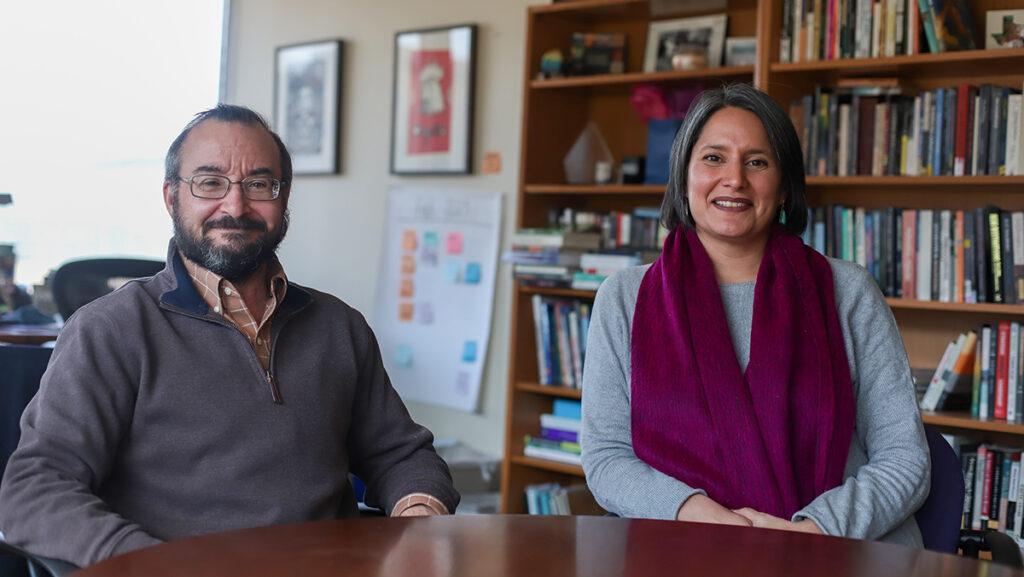Ithaca College introduced the new Center for Equity, Inclusion, and Belonging in an email announcement March 23, which will officially open July 1.
In the announcement, President La Jerne Cornish said the center is another step toward being a model for institutions promoting diversity, equity, inclusion and belonging. Cornish said the center’s establishment aligns with the goals of the Ithaca Forever strategic plan.
“Ithaca College understands that a deep commitment to our communities requires that we embrace an equity framework and value diversity to honor and mirror the lived experiences of our students,” the strategic plan states. “We will become a national model for inclusive excellence in higher education. We value diversity as a source of strength for our community that will build understanding and fuel vibrancy, creativity, and innovation on our campus.”
The two people hired to lead the center are Luca Maurer, new executive director for Student Equity, Inclusion, and Belonging and the outgoing director of LGBTQ Education, Outreach and Services, and Belisa González, new dean of Faculty Equity, Inclusion, and Belonging, and professor and outgoing director for the Center for Study of Culture, Race and Ethnicity.
Maurer, who was previously the interim executive director for Student Equity, Inclusion, and Belonging, reports to Bonnie Prunty, vice president for Student Affairs and Campus life. González will report to Melanie Stein, provost and senior vice president for academic affairs.
“I am especially grateful that Luca and Belisa have agreed to be a part of this new leadership team, as they possess significant expertise and have been passionately engaged in advancing our work for many years,” Cornish said.
Prunty said the college plans to fill their positions by the start of Fall 2023 but that in the meantime, Maurer and González will continue in their current roles while the transition occurs.
“What [the center] does, from our perspective, is gain a lot in terms of two really talented, passionate individuals who have done incredible work in this area for our campus already, but they’ve done it as an add on to things that they’re already doing, and now they’ll be able to do it as the primary focus,” Prunty said.
Maurer and González have already started their full-time directorships, meaning Maurer and González will eventually be stepping down from their other roles, although González will continue teaching one course per semester.
“I feel like if I’m going to be working with faculty, to help folks create more inclusive environments and have more equitable practices, it’s really important for me to still be teaching,” González said.
Cornish said the new center provides an organized structure to promote values of equity, inclusion and belonging; holds the campus community and institution accountable; and builds systems of support that will last.
There will be a third position in the center that will work with staff equity and inclusion and report to the associate vice president and chief human resources officer. Kirra Franzese is the current associate vice president and chief human resources officer. Cornish said the college is seeking someone for the position.
Prunty said the intention is to sunset the Diversity Equity, Inclusion, and Belonging subgroup of the Strategic Plan Committee at the end of the 2022–23 academic year and convene the President’s Advisory Committee to support the new center’s initiatives.
“That group will ultimately provide guidance and advice to both the president and to the center in terms of opportunities, feedback [and] how we can move forward to meet our strategic goals,” Prunty said. “But we still need to develop the exact membership, the charge and who are the individuals we’re asking to lead that group.”
Prunty also said the logistics of administrative support for the center is still being figured out as well as a physical location for the center.
Campus Climate Survey
The new center will take the lead on implementing a Fall 2023 campus climate survey in partnership with Rankin & Associates Consulting, which is the company the college brought in on the last climate survey. The last survey was done in Fall 2016 and the results were presented in April 2017. The previous campus climate survey was conducted in Fall 2012 but results were not released until February 2015.
“The last time we did a climate survey, there was a very strong recommendation that this would become a routine thing that we would do every so many years on our campus so that we could look at, ‘Where are we making progress and where are we not making progress?’” Prunty said.
Diversity, Equity & Belonging for Students course
One of the center’s initiatives is looking into another potential medium for the virtual diversity, equity and belonging training module that new students take at the beginning of their time at the college. The center will not be reviewing the Title IX and drug and alcohol modules. Prunty said the contract for the online module is going up at the end of the summer, which is one reason the college wants to review training options; to decide whether to renew the contract.
“My goal [for the training] is how can we support every student in getting what they need on campus and in acting in solidarity with anyone who is not and and knowing what that is?” Maurer said. “So that not only are [students] not contributing to problems, but they are helping to solve them.”
Land Acknowledgement
A third goal that Maurer and González are working on, in addition to land acknowledgments, is rebuilding relationships with the Gayogo̱hó꞉nǫˀ Nation.
“Are we merely acknowledging that we are on unseeded land or are we acting in ways to address historical, long-standing inequities?” Maurer said. “It has to be mutually beneficial. It can’t just be because the institution says, ‘Well, now we want to do this.’”
Both Maurer and González said the major benefit of transitioning to the center is that they can commit time and energy to doing intentional, thoughtful work.
“Historically, there have been some faculty and staff who have had relationships with the leadership of the Gayogo̱hó꞉nǫˀ but we need to revisit and reignite those relationships and create a land acknowledgement that they will be a part of,” González said.
In general, the center will focus on long-term change by taking time to understand foundational solutions that can be implemented.
“At least at this stage, imagining what can be is very exciting, because I think the work has been structured as such right now that we’re stuck in what is often very reactive,” González said. “A lot of equity is about time. It’s about having the opportunity and the wherewithal to slow down and think through scenarios and the effects that decisions [and] policies, what have you, is going to have on minoritized individuals and groups of people.”










